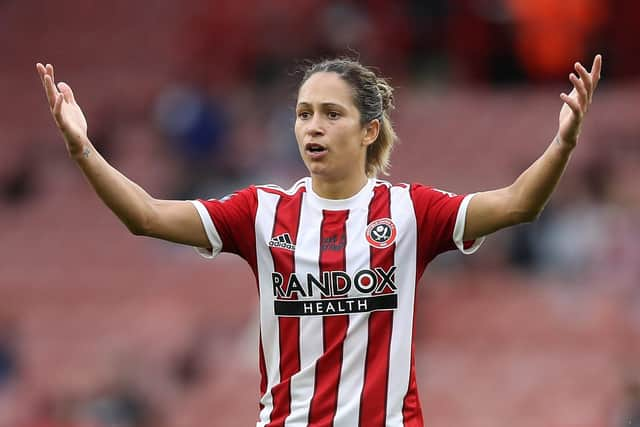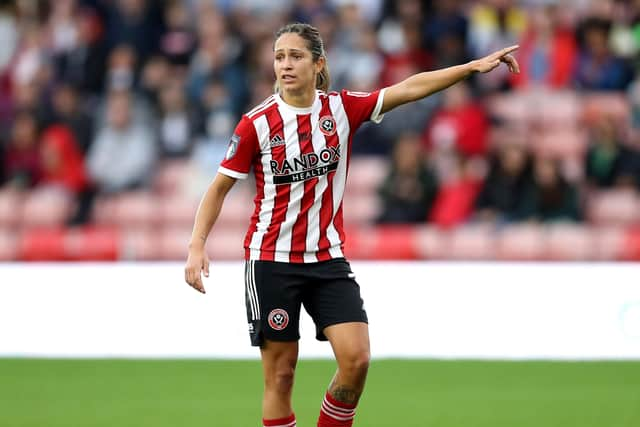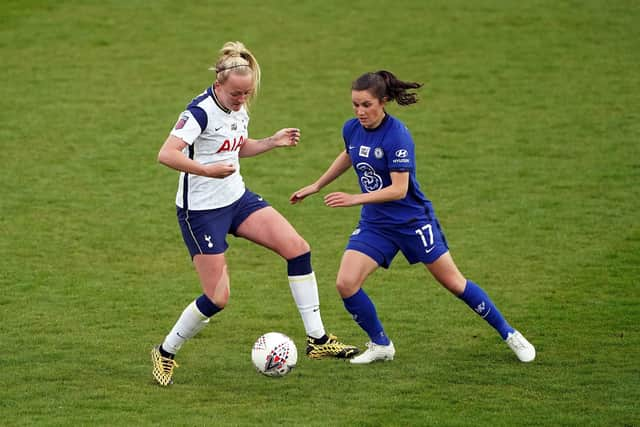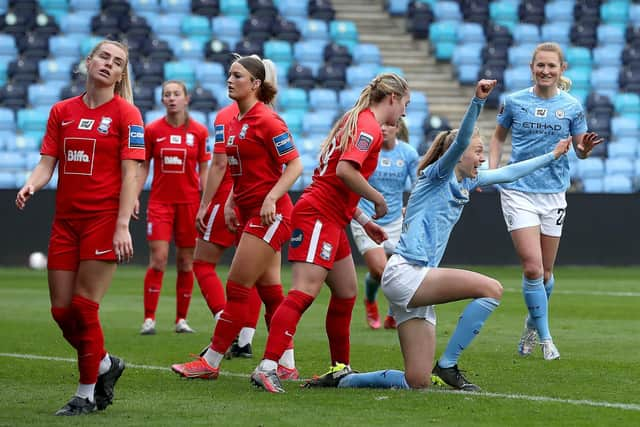Women’s Football Weekend: Sheffield United’s Courtney Sweetman-Kirk keen to play her part in leaving lasting legacy in women’s game
Little could she have foreseen back then as a teenager breaking into the Leicester City first team that a decade and a half later she would actually be getting paid to not only play football, but talk about the women’s game as well.
She has certainly had a front row seat to the transformation of women’s football; from those days of it being an after-thought to its new-found parity at clubs amid the race towards football’s gender equality.


Advertisement
Hide AdAdvertisement
Hide AdThat might still be a generation away, cautions Sweetman-Kirk, who is very much of the opinion that women’s football needs to walk before it runs.
The journey continues with the third instalment of the Women’s Football Weekend over the next two days, a Football Association-driven initiative to help broaden the appeal of the women’s game during an international break for the men’s Premier League and Championship.
Arsenal meet Tottenham Hotspur this lunchtime in a game televised on BBC One while Everton host Manchester United on Sky Sports tomorrow; two feature games that come as part of the landmark broadcast contract the women’s game signed earlier this summer.
Sweetman-Kirk and her Sheffield United team-mates are at London City Lionesses in the second-tier FA Women’s Championship tomorrow, a game that can be viewed on the FA Player. The broadcasters are paying £24m over three years to the WSL, 25 per cent of which goes into the Championship.


Advertisement
Hide AdAdvertisement
Hide Ad“The way we’ve built up women’s football is from the top down,” says Sweetman-Kirk, who also works in broadcasting with Sky Sports among others.
“I get why that is, it’s had to be that way. Our game is different from the men’s game, which had years and years of building from the grassroots upwards until the Premier League came in. In women’s football we’ve had to go top down.
“But eventually that money needs to spread all the way down the pyramid.
“The WSL and the Championship are the showpiece, but we need to keep building that because we’ve seen in the pandemic how fragile men’s and women’s clubs can be, so it’s important we keep building for the pyramid underneath the Championship.”


Advertisement
Hide AdAdvertisement
Hide AdFor Sweetman-Kirk, patience is the watchword, not doing too much, too fast.
“For now the broadcast deal goes to the Championship, but eventually we want it trickling all the way down,” says Sweetman-Kirk, who trains three nights a week with United in their hybrid format of having full-time and part-time players.
“Eight out of the 12 teams in the Championship are now hybrid or full-time.
“The next step is to get all the teams in the Championship full-time, same as they are in the Super League, and turn that into a full-time league.


Advertisement
Hide AdAdvertisement
Hide Ad“So it’s going to take 10, 15 years, maybe even longer to get parity. We’ve got the cultural impact of men’s football being the main sport in this country, and we need to get over those cultural barriers. It might take the next generation to come in and see it for what it is before it can really blossom.
“You see it in America the amount of times the North America Women’s Soccer League has gone bust, we don’t want to be in a position where that happens to the WSL and we have to start again.
“The way we are doing it is slow, but it’s consistent, and that’s the most important thing.
“There’s a constant upward trajectory and our generation of footballers needs to leave the women’s game in a better place than we found it. I think we are doing that.”
Advertisement
Hide AdAdvertisement
Hide AdThe game Sweetman-Kirk found 15 years ago was unrecognisable to what it is now.
By her early teens she had to decide between football and tennis. Her grandmother wanted her to be the next Serena Williams but she chose football not for the riches it promised, but purely for her love of the game.
“I used to tell people I wanted to be a footballer, there was nothing in terms of a professional career where that was possible,” continues Sweetman-Kirk, who had posters of David Beckham on her wall because there were no female football role models like there are today. “I got a few sniggers from the adults for dreaming that, but I’ve had the last laugh.”
She certainly has, starting out at Leicester and then playing for Lincoln and Doncaster Rovers Belles before finally reaping the benefits of life as a women’s footballer when she joined Everton in 2017.
Advertisement
Hide AdAdvertisement
Hide Ad“Everton for me was the best example of a set-up that was properly integrated with the men’s team, training at Finch Farm, experiencing what full-time football should be,” she tells The Yorkshire Post.
“You’d be walking round next to Wayne Rooney saying hello to everyone. That was important to feel welcome at the club.”
For Sweetman-Kirk, now 30, that alliance with an established men’s team – something she later found at Liverpool and is experiencing again with the Blades – is the best model to help the women’s game grow.
“It’s not just the money that’s the important bit for me it’s how you’re treated within the club, the channels of communication, how open that is and the resources you’re afforded,” she adds, mindful of the joint access to treatment and resources both the men’s and women’s teams at United are entitled to.
Advertisement
Hide AdAdvertisement
Hide Ad“We’re treated as equals. I’ve been at clubs where we have been treated as equals and also clubs where we haven’t been treated as equals, and Sheff U is definitely a place where you’re made to feel a massive part of the squad as a whole.
“It’s difficult when you’ve only got that independent backing. When I was at Donny Belles we had independent investment, and while they were lovely people and wanted to do the right thing, they didn’t quite have that football knowledge and how to use that money.
“It’s important that: 1. the money is there, and 2. the right people are at the head of it, they’ve had that experience and know how to use it.”
Next summer sees the Women’s European Championships come to England, with games to be played at Bramall Lane and Rotherham United’s New York Stadium, as well as across the country.
Advertisement
Hide AdAdvertisement
Hide AdThat, and this weekend’s special focus on the women’s game, are all important staging posts in the growth of the women’s game.
“It’s important events like Women’s Football Weekend keep going, that we keep building. Nine times out of 10 that’s what I always find with fans that haven’t watched women’s football before, it’s very rare that someone has gone there and said ‘I didn’t enjoy that’.
“That’s half the barrier – overcoming people’s prejudice about women’s football. Once they watch it and take it for what it is and don’t compare it to the men’s, then that can only be a good thing.”
Comment Guidelines
National World encourages reader discussion on our stories. User feedback, insights and back-and-forth exchanges add a rich layer of context to reporting. Please review our Community Guidelines before commenting.
